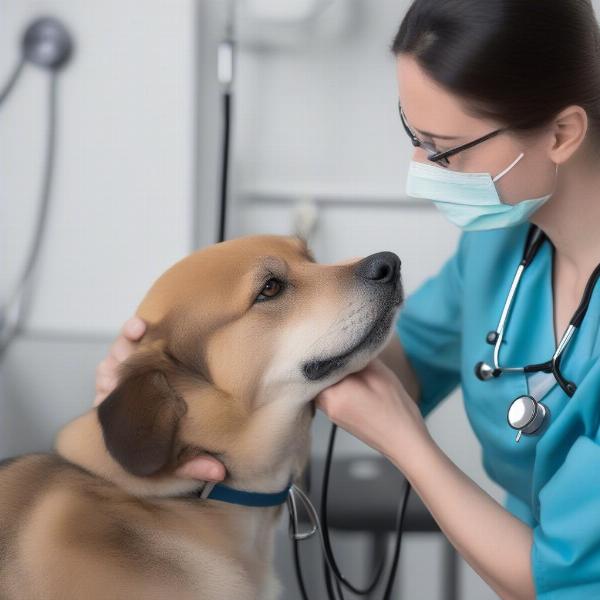If you’ve noticed your dog breathing fast but not panting while sleeping, you’re probably wondering if it’s normal. This is a common concern for dog owners, and understanding the difference between rapid breathing and panting is key to knowing when to worry. While panting is typically associated with heat or exertion, rapid breathing during sleep can have various causes, ranging from normal sleep cycles to underlying medical conditions. Let’s explore the reasons behind fast breathing in sleeping dogs and when it’s time to seek veterinary attention.
Understanding Normal Sleeping Respiration in Dogs
Just like humans, dogs experience different sleep stages. During deep sleep, known as REM (Rapid Eye Movement) sleep, their breathing can become irregular and faster. This is often accompanied by twitching, whimpering, or even small barks. This is generally considered normal and nothing to be concerned about. However, consistently rapid, shallow breathing, especially when accompanied by other symptoms, warrants further investigation.
When Fast Breathing Isn’t Normal: Potential Causes
While some degree of rapid breathing during sleep is normal, it’s crucial to recognize when it might indicate a problem. Several factors can contribute to abnormal rapid breathing in sleeping dogs:
Respiratory Issues
Conditions like pneumonia, bronchitis, or asthma can cause rapid breathing, even during sleep. These conditions often come with other symptoms such as coughing, wheezing, or nasal discharge.
Heart Problems
Heart disease can make it difficult for the heart to pump blood efficiently, leading to fluid buildup in the lungs. This can cause rapid, shallow breathing, and you might also notice a bluish tinge to your dog’s gums.
Pain and Discomfort
If your dog is experiencing pain, they might breathe rapidly. This can be due to an injury, arthritis, or other underlying medical conditions. Observe your dog for any signs of discomfort or changes in behavior.
Anemia
Anemia, a deficiency in red blood cells, reduces the blood’s oxygen-carrying capacity. This can lead to increased respiratory rate as the body tries to compensate for the lack of oxygen.
Stress and Anxiety
Stressful situations or anxiety can cause rapid breathing. If your dog has recently experienced a change in environment or routine, this could be a contributing factor.
Medications
Certain medications can have rapid breathing as a side effect. If your dog is on any medication, consult your veterinarian to determine if this is a potential cause.
“Rapid breathing in a sleeping dog can be tricky to interpret,” says Dr. Emily Carter, DVM, “While often a part of normal sleep, it’s essential to consider other accompanying symptoms and the dog’s overall health. When in doubt, it’s always best to err on the side of caution and consult a vet.”
What to Do If Your Dog Is Breathing Fast While Sleeping
If you’re concerned about your dog’s rapid breathing during sleep, here’s what you should do:
- Observe for other symptoms: Look for any accompanying signs such as coughing, wheezing, blue gums, or changes in behavior.
- Monitor the frequency and duration: Note how often the rapid breathing occurs and how long it lasts.
- Consult your veterinarian: If the rapid breathing is persistent, frequent, or accompanied by other symptoms, schedule an appointment with your vet.
- Provide a comfortable environment: Ensure your dog has a calm and comfortable sleeping area free from stressors.
 Dog Vet Checkup for Breathing Issues
Dog Vet Checkup for Breathing Issues
Conclusion
While observing your dog breathing fast but not panting while sleeping can be alarming, it’s often a normal part of their sleep cycle. However, being aware of potential underlying causes and knowing when to seek veterinary attention is crucial for ensuring your dog’s health and well-being. By carefully observing your dog and consulting with a professional, you can address any concerns and provide the best possible care.
FAQ
- Is it normal for a dog to breathe fast while sleeping? Sometimes yes, especially during REM sleep. However, consistently rapid breathing could indicate a problem.
- What are the signs of abnormal rapid breathing in dogs? Look for accompanying symptoms like coughing, wheezing, blue gums, or behavioral changes.
- When should I take my dog to the vet for rapid breathing? If the rapid breathing is persistent, frequent, or accompanied by other symptoms, consult your vet.
- Can stress cause rapid breathing in dogs? Yes, stress and anxiety can lead to increased respiratory rate.
- What should I do if my dog is breathing fast while sleeping? Observe for other symptoms, monitor the frequency and duration, and consult your vet if necessary.
- How can I make my dog’s sleeping environment more comfortable? Provide a calm and quiet space free from distractions and stressors.
- Are there any medications that can cause rapid breathing in dogs? Yes, some medications can have this side effect. Consult your vet if your dog is on medication.
“It’s always better to be safe than sorry,” adds Dr. Carter. “Early detection and intervention can significantly improve outcomes for many medical conditions.”
ILM Dog is a leading international pet website dedicated to providing expert advice and resources for dog owners worldwide. We offer a comprehensive range of information on dog breeds, health, training, nutrition, grooming, and much more. From choosing the right breed to understanding your dog’s behavior, ILM Dog is your go-to source for all things canine. We are passionate about helping you provide the best possible care for your furry friend. Contact us at [email protected] or +44 20-3965-8624 for expert advice and personalized support. Connect with us today and discover a world of valuable resources for your beloved companion.